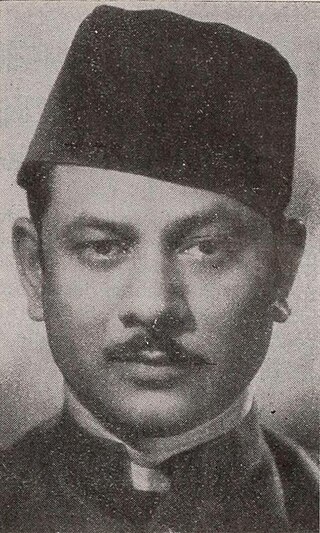
Mehboob Khan was a pioneer producer-director of Indian cinema, best known for directing the social epic Mother India (1957), which won the Filmfare Awards for Best Film and Best Director, two National Film Awards, and was a nominee for the Academy Award for Best Foreign Language Film. He set up his production company – Mehboob Productions, and later a film studio – Mehboob Studios in Bandra, Mumbai in 1954. He also created the dacoit film genre with Aurat (1940) and Mother India, and is also known for other blockbusters including the romantic drama Andaz (1949), the swashbuckling musical Aan (1951), and the melodrama Amar (1954).

"Ali Baba and the Forty Thieves" is a folk tale in Arabic added to the One Thousand and One Nights in the 18th century by its French translator Antoine Galland, who heard it from Syrian storyteller Hanna Diyab. As one of the most popular Arabian Nights tales, it has been widely retold and performed in many media across the world, especially for children.

Anil Krishna Biswas, professionally known as Anil Biswas, was an Indian film music director and playback singer from 1935 to 1965, who apart from being one of pioneers of playback singing, is also credited for the first Indian orchestra of twelve pieces and introducing orchestral music and full-blooded choral effects, into Indian cinema. A master in western symphonic music was known for the Indian classical or folk elements, especially Baul and Bhatiyali in his music. Out of his over 90 films, most memorable were, Roti (1942), Kismet (1943), Anokha Pyar (1948), Tarana (1951), Waaris (1954), Pardesi (1957) and Char Dil Char Rahen (1959).
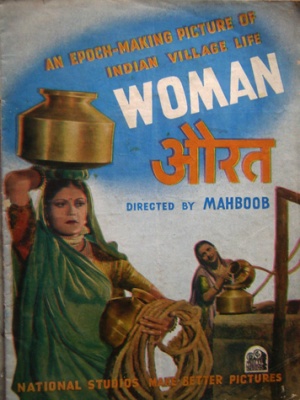
Aurat, also known by its English title Woman, is a 1940 Indian film directed by Mehboob Khan and starring Sardar Akhtar, Surendra, Yakub, Kanhaiyalal and Arun Kumar Ahuja. The film's music is by Anil Biswas and dialogue is by Wajahat Mirza. Mehboob Khan later remade this film as Mother India (1957), which is considered one of the biggest hits of all time in Indian Cinema.
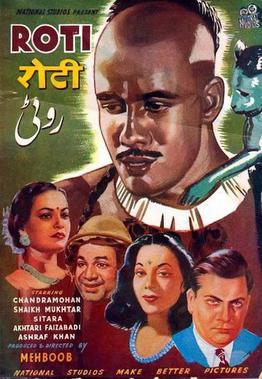
Roti is a 1942 Indian Hindi film directed by Mehboob Khan. This movie was anti-capitalist.

Bookh (Hunger) is a Bollywood film. It was released in 1947. Safdar Aah, a writer and lyricist, turned producer and director with Bhookh. Made under the Rang Mahal Ltd. banner, the film starred Sheikh Mukhtar, Kanhaiyalal, and new find actress Husna, in the main lead with music by Anil Biswas. Actress Kiran played the second female lead in her debut role. Others in the cast included Agha, Dulari, Narmada Shankar and Abu Bakar.
Hum Tum Aur Woh is a 1938 Hindi/Urdu social drama film. The film was directed by Mehboob Khan for Sagar Movietone. The music was composed by Anil Biswas with lyrics by Wajahat Mirza and Zia Sarhadi. The cinematographer was Faredoon Irani. The film starred Motilal, Maya Banerjee, Rose, Yakub and Sankatha Prasad. The film was a romantic triangle involving Moti (Motilal), Bina the girl he's engaged to and Leela (Rose) who is obsessed with him.

Watan (transl. Homeland) is a 1938 Hindustani costume drama film directed by Mehboob Khan. Produced by Sagar Films, the film had story by Mehboob Khan and Wajahat Mirza. The cinematographer, as for most Sagar films, was Faredoon Irani. Following the successful music of Manmohan (1936), Sagar Movietone retained Anil Biswas as the in-house music director, scoring music for Watan along with other releases of the time from the studio. The cast of the film included Kumar, Bibbo, Maya Banerjee, Yakub Lala, Sitara Devi and Kayam Ali.
Manmohan is a 1936 Indian Urdu/Hindi-language romantic tragedy film directed by Mehboob Khan. This was Khan's third film for Sagar Movietone after Al Hilal (1935) and Deccan Queen (1936). The cinematographer was Faredoon Irani who, starting from Mehboob Khan's Al Hilal (1935), went on to establish a long working relationship with him lasting till Khan's last film Son of India (1962). The music was composed by Ashok Ghosh assisted by Anil Biswas. The story writer was Zia Sarhadi who also wrote the lyrics, screenplay and dialogue in addition to acting in the film. Though he had started his writing career on Khan's backing for Deccan Queen (1936), it was with Manmohan that he achieved success. The film was inspired by Devdas, (1935), which was a big hit at the box office. Surendra was chosen as the singing star to rival K. L. Saigal from New Theatres Calcutta, whose songs from Devdas had mesmerised the nation. Though Manmohan was referred to as the "poor man's Devdas" the film went on to do well and the songs became very popular. The film starred Bibbo, Surendra, Yakub, Kayam Ali, Bhudo Advani and Mehdi Raza.
Jagirdar (Landlord) is a 1937 Hindi romantic melodrama film directed by Mehboob Khan, and starring Bibbo, Motilal, Surendra, Yakub, Pande, Sankatha Prasad, Pesi Patel and Maya Banerjee.

Bahen is a 1941 Hindi film directed by Mehboob Khan. Sagar Movietone had closed down at the start of WW II and reformed as National Studios. It was under the new banner that Mehboob Khan produced his three important films of that time, Aurat (1940), Bahen (1941) and Roti (1942). Written by Babubhai Mehta and Zia Sarhadi, it had dialogues and screenplay by Wajahat Mirza. The cinematography was by Faredoon Irani. Anil Biswas was the music director with lyrics by Safdar Aah. The cast included Sheikh Mukhtar, Nalini Jaywant, Harish, Kanhaiyalal, Husn Bano, Swaroop Rani, Baby Meena and Bhudo Advani.

Alibaba And 40 Thieves is a 1954 Hindi fantasy action film directed by Homi Wadia. The film was a Basant pictures presentation under the Wadia Brothers Production banner. The story, screenplay and additional dialogue were by J. B. H. Wadia, while the dialogues were written by Chand Pandit and Tahir Lucknavi. The art direction and special effects were by Babubhai Mistry. The music was composed by Chitragupta and S. N. Tripathi. Chitragupta had worked as an assistant to S. N. Tripathi in some of the mythology and fantasy films before branching out on his own. The lyricist was Raja Mehdi Ali Khan. It stars Mahipal, Shakila in the lead roles, with S. N. Tripathi, B. M. Vyas, Sharda, Lalita Kumari and Helen.
Prarthana (transl. Prayer) is a 1943 Indian Hindi-language social film directed by Sarvottam Badami for Sohrab Modi's Minerva Movietone. The music director was Saraswati Devi and the lyricist was Safdar Aah Sitapuri. Having worked for Madan Theatres Ltd and Sagar Movietone in the 1930s, the famous singer and actress Jehanara Kajjan returned to work after a hiatus of four years working for studios like Minerva Movietone. Prarthana is cited as "probably" her last film before her death in 1944. The film starred Motilal, Jahanara Kajjan, Sabita Devi, Sajjan, Nimabalkar, K. N. Singh, Sadat Ali, Mehboob and Abu Bakar.

Arun Kumar Ahuja, popularly known as Aroon, was an Indian actor and producer who was active in Hindi cinema in the 1940s and early 1950s, appearing in over 30 films in both leading and supporting roles. He was married to singer and actress Nirmala Devi and is the father of actor Govinda.
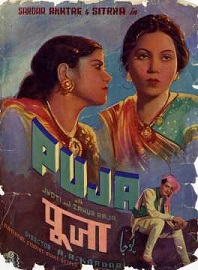
Pooja (Worship) is a 1940 Indian Hindi/Urdu-language psychological drama film directed by A. R. Kardar. The music director was Anil Biswas, with lyrics by Khan Shatir Ghaznavi. Produced by National Studios, the story, screenplay and dialogue writer was M. Sadiq and the cinematographer was P. G. Kukde. The film starred Sardar Akhtar, Zahur Raja, Sitara Devi, Jyoti, Sankatha Prasad, Sunalini Devi, Bhudo Advani and Baby Meena.

Surendra was an Indian singer-actor of Hindi films. Known by his mononym, Surendra was born and educated in Punjab to be a lawyer by profession. He came to Bombay to become a singer on the recommendation of a Delhi distributor and his friends. He was "picked" by Mehboob Khan whom he met at Sagar Movietone, to sing and act in films as an alternative to the then Calcutta-based singer-actor, K. L. Saigal. Surendra started his career with his debut starring role in Deccan Queen (1936), directed by Mehboob Khan. He soon became a part of Sagar Movietone when his song "Birha Ki Aag Lagi More Man Mein" from the film became an "instant hit".
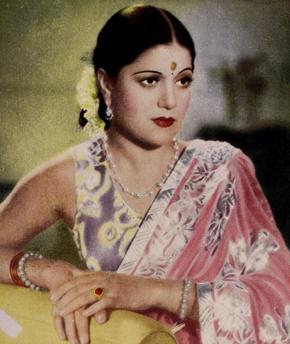
Sardar Akhtar (1915–1986) was an Indian actress who worked in Hindi and Urdu films. She started her acting career on the Urdu stage. Her early films were with Saroj Movietone, where she did a majority of stunt (action) roles. She came into prominence as the washer-woman in the role of Rami Dhoban in Sohrab Modi's Pukar (1939). As a woman seeking justice for the death of her husband, it was a breakthrough role for her. A popular song she sang in the film was "Kaheko Mohe Chhede". Her career defining role was as a "peasant woman" deserted by her husband, in Mehboob Khan's Aurat (1940), a role later made famous by Nargis in Mehboob's remake Mother India.

Bibbo was a music composer, singer and actress who worked in both Indian and Pakistani films. She acted in Indian cinema from 1931 to 1947 before moving to Pakistan, following Partition of India in 1947. She started her acting career with Ajanta Cinetone Ltd. in 1933, working with directors like M. D. Bhavnani and A. P. Kapoor. She was one of the top leading ladies of the 1930s along with actresses like Devika Rani, Durga Khote, Sulochana, Mehtab, Shanta Apte, Sabita Devi, Leela Desai and Naseem Banu. She was referred to as "one of the most important female stars of the 1930s and 1940s". Her fame had her featured in the lyrics of a popular song from the film Gharib Ke Lal (1939) sung by Mirza Musharraf and Kamla Karnataki, with music by Sagheer Asif and lyrics by Rafi Kashmiri. "Tujhe Bibbo Kahoon Ke Sulochana", where Sulochana referred to another popular actress of the time. This was the first time a song featuring famous actors was used in the lyrics of a film song.

Sagar Movietone also Sagar Films, Sagar Film Company and Sagar Productions was an Indian film production company involved in the making of films for Indian cinema. It was launched by Ardeshir Irani with Chimanlal Desai and Dr. Ambalal Patel in 1929 in Bombay, Maharashtra, India. Sagar was initially started as a branch company of Ardeshir's Imperial Film Company. Several key figures from Imperial, such as Mehboob Khan were shifted to Sagar. The studio was in operation from 1930 to 1939. In 1940, it combined with General Pictures to form National Studios. It made "Parsi theatre based films, mythologicals and stunt movies". Sagar fostered the career of many artists who rose to prominence. Early directors such as Prafulla Ghosh, Sarvottam Badami, Ezra Mir and Nanubhai Vakil were promoted by the company. Mehboob Khan got his first break as a director in Al Hilal in 1935. He was referred to as "the most important alumnus" from Sagar, who went on to become one of Indian cinema's "most influential film-makers".

Bhudo Advani was an Indian character actor and comedian. He started his acting career in theatre with the notion of spreading awareness on social issues. He came to Bombay on the advice of an Ajanta Cinetone representative and was offered a role in the film Afzal, also called Hoor-E-Haram in 1933, directed by Mohan Bhavnani. He later joined Sagar Movietone, becoming an important fixture in most films produced by them. He turned from character roles to comedy performing in Dr. Madhurika (1935), directed by Sarvottam Badami, Deccan Queen (1936) and Do Diwaane (1936), by C. Luhar.
















